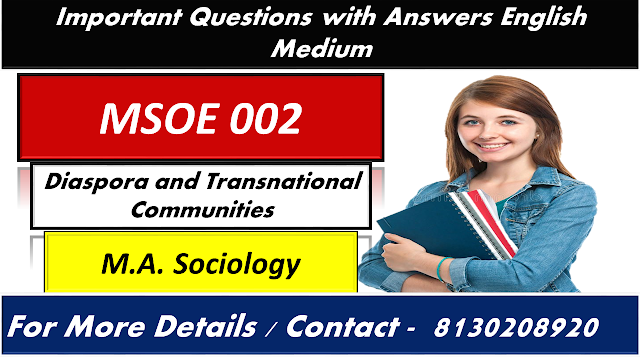IGNOU MSOE 002 Important Questions With Answers English Medium
MSOE 002 Diaspora and Transnational Communities It explores
the phenomenon of diaspora and transnational communities, delving into their
formation, characteristics, experiences, and impact on societies. It examines
how individuals and groups maintain connections across borders, negotiate
identities, and shape social, cultural, and political landscapes.
Course
Structure:
- Module 1: Introduction to Diaspora and Transnationalism
- Module 2: Historical Perspectives on Diasporic Communities
- Module 3: Experiences of Diasporas and Transnational Communities
- Module 4: Transnational Networks and Mobilization
- Module 5: Identity and Belonging in Diasporas
- Module 6: Political and Economic Impact of Diasporas
- Module 7: Contemporary Issues in Diaspora Studies
Q.1
Discuss the retentionist and ethnic perspectives on the study of Indian
diaspora.
The study of the Indian diaspora involves diverse
perspectives, reflecting the complex interplay of historical, cultural, and
social factors. Two prominent viewpoints in this discourse are the retentionist
perspective and the ethnic perspective. These perspectives offer distinct
lenses through which scholars analyze the experiences, identity, and cultural
dynamics of the Indian diaspora, shedding light on both the preservation of
cultural ties and the negotiation of ethnic identities in various host
countries.
IGNOU MSOE 002 Important Questions With Answers English Medium-The retentionist perspective in the study of the Indian
diaspora emphasizes the preservation and continuation of Indian cultural
practices, traditions, and values among diasporic communities. Scholars
adopting this viewpoint focus on how Indian immigrants and their descendants
actively maintain a strong connection with their cultural roots, often
reproducing traditional practices in host countries. This perspective
acknowledges the significance of cultural retention as a source of identity and
community cohesion within diasporic populations.
One key aspect of the retentionist perspective is the
emphasis on cultural institutions, community organizations, and religious
practices that serve as focal points for preserving Indian traditions. Temples,
cultural centers, and community associations become spaces where diasporic
individuals come together to celebrate festivals, perform religious rituals,
and engage in cultural activities. These institutions play a crucial role in
fostering a sense of belonging and continuity, providing a space for the
transmission of language, customs, and values to successive generations.
IGNOU MSOE 002 Important Questions With Answers English Medium-Moreover, the retentionist perspective considers the role of
cultural festivals and events as mechanisms for reinforcing ties to Indian
heritage. Celebrations of Diwali, Holi, and other cultural festivals become
occasions for diasporic communities to gather, share traditions, and pass on
cultural knowledge. The retentionist perspective recognizes the importance of
these communal celebrations in sustaining a connection to Indian identity and
fostering a sense of solidarity among diasporic individuals.
Also Read-
- IGNOU MSO 004 Important Questions With Answers English Medium
- IGNOU MSO 003 Important Questions With Answers English Medium
- IGNOU MSO 002 Important Questions With Answers English Medium
On the other hand, the ethnic perspective in the study of the
Indian diaspora focuses on the negotiation and adaptation of ethnic identities
in the context of diverse host societies. This perspective acknowledges that
diasporic individuals navigate multiple cultural identities, blending elements
of their Indian heritage with the cultural landscapes of their adopted
countries. Scholars adopting the ethnic perspective examine how Indian diasporic
communities evolve over time, adopting new cultural practices while
simultaneously retaining aspects of their Indian identity.
IGNOU MSOE 002 Important Questions With Answers English Medium-The ethnic perspective recognizes the dynamic nature of
identity formation within the Indian diaspora, highlighting the hybridity and
fluidity of cultural affiliations. Diasporic individuals often engage in a
process of cultural syncretism, integrating elements from both their Indian
heritage and the host culture. This adaptation may manifest in language use,
clothing choices, and culinary preferences, reflecting a nuanced negotiation of
identity that transcends rigid boundaries.
Moreover, the ethnic perspective explores the role of
diasporic individuals in contributing to the cultural diversity of their host
societies. As members of multicultural communities, individuals from the Indian
diaspora actively participate in and contribute to the broader cultural milieu.
This engagement results in the creation of new cultural expressions that
reflect the interplay between Indian heritage and the diverse influences of the
host country.
While the retentionist perspective underscores the importance
of maintaining a connection with Indian culture, the ethnic perspective
recognizes the agency of diasporic individuals in shaping their identity
through dynamic interactions with diverse cultural contexts. The ethnic
perspective encourages a more fluid and inclusive understanding of diasporic
identity, moving beyond static notions of cultural preservation to embrace the
complexities of multicultural experiences.
Q.2
Examine the features of Indian emigration in the Caribbean.
Q.3
Discuss the Indian State Policy on diaspora in the Post-independence period.
Q.4
Examine the situation of Indian diaspora in Canada.
Q.5
Discuss the migration pattern from India to the Gulf countries.
Q.6
Examine the Organisational linkages between the Indian diaspora.
Q.7
Discuss the nature of political involvements of the Indian diaspora with their homeland.
Q.8
Highlight the new policies for mobilising diasporahomeland relations.
Q.9
Examine the nature of Indian diasporic writings.
Q.10
Discuss the popular perception of Indians on the Indian diaspora.
Q.11
Explain the concept of diaspora and transnationalism.
Q.12
Discuss the plural society perspective in the study of diaspora.
Q.13
Examine the main issues of identity among the Indian diaspora in Africa.
Q.14
Discuss the historical evolution of Indian diaspora and its relationship to
cyberspace
Q.15
Discuss the Indian Diasporic Novel in Canada with suitable illustrations.







0 comments:
Note: Only a member of this blog may post a comment.